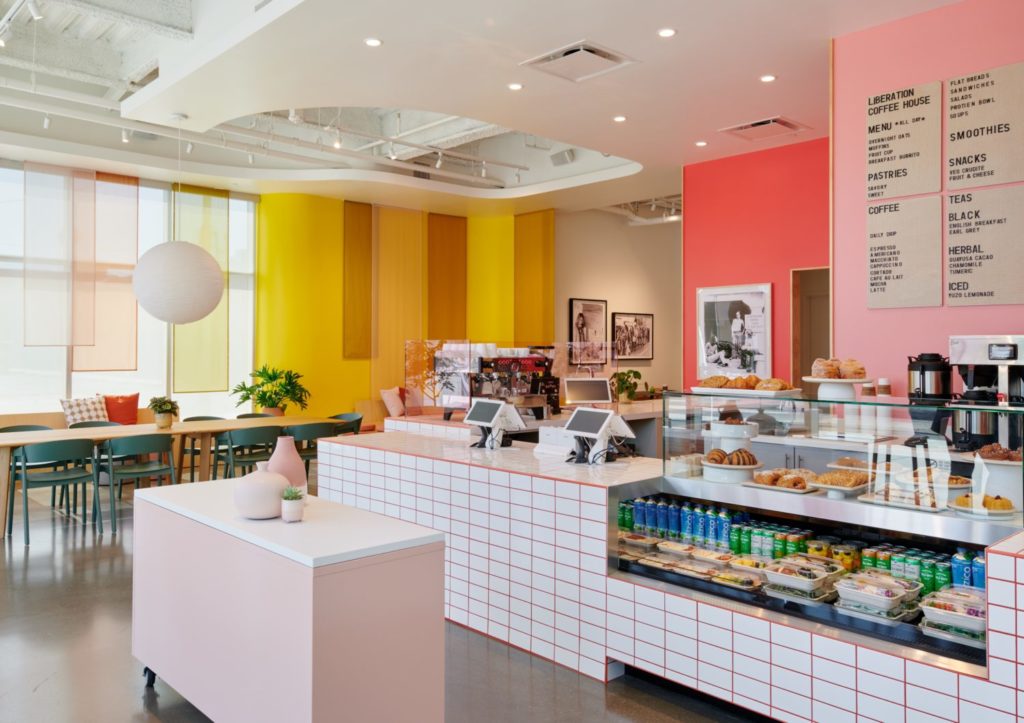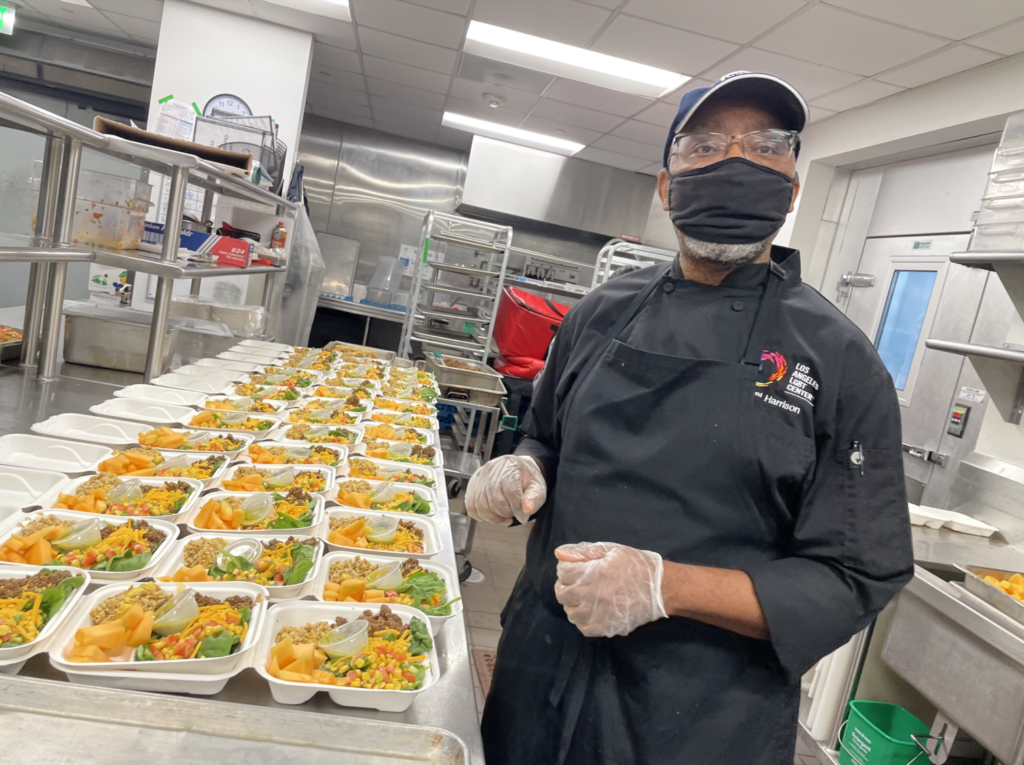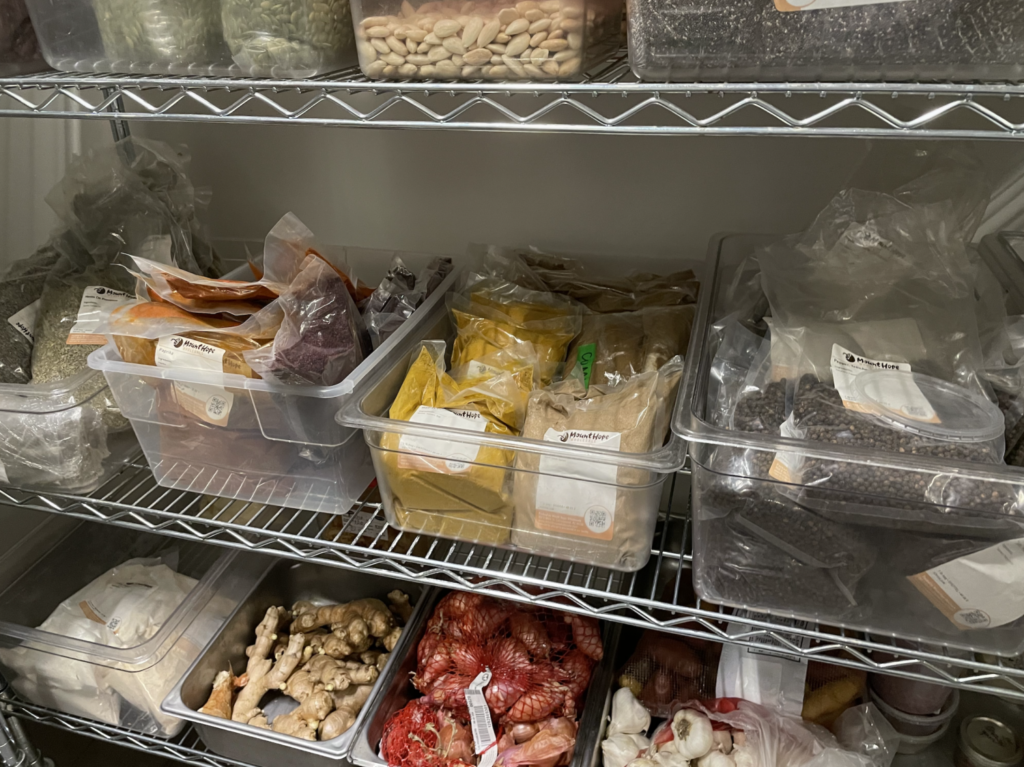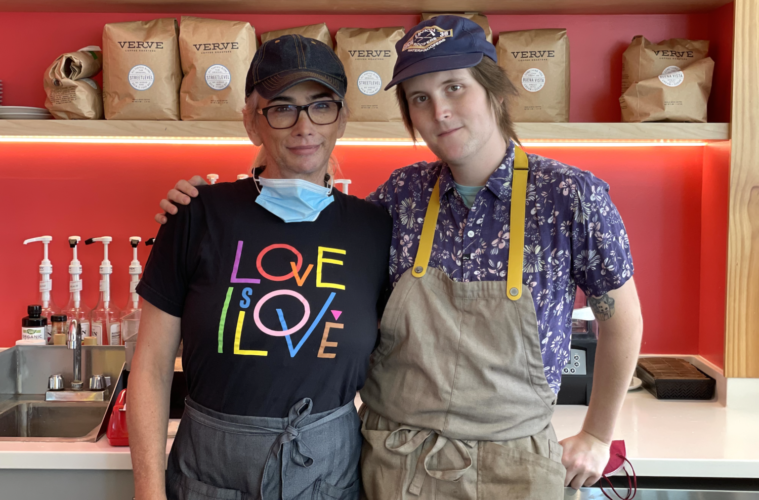At a time when many of the funky independent cafes are dwindling in West Hollywood and haven’t reopened since the pandemic, and big coffee chains are rethinking and redesigning their layouts geared more toward grab-and-go than stop and chat, Liberation Coffee House at the L.A. LGBT Center is determined to bring back cafe society.
The coffeehouse is bright and airy, framed in rose and golden hues, designed to mimic a soothing sunset. The design comes equipped with a photogenic space for TikTok or IG Reels, free Wi-Fi, electrical outlets everywhere, communal tables and seating areas for group study, and a café menu with approachable price points that don’t reflect today’s inflation economy.
“We want to bring back the traditional coffeehouse feel, where you come in, sit down, work on your project and meet your friends here,” barista Willow Fields tells L.A. Weekly while pouring a tall iced mint tea.

Courtesy Liberation Coffee House
“What I love the most about being a barista here is the community aspect and connecting with folks,” she says. “Especially in a place like this, where people are looking for somewhere safe and to meet with members of the LGBT community. So many of the spaces in the queer community are centered around alcohol and dancing in nightclubs. It’s nice to have an inclusive environment during the day and office hours. People come here to work and socialize, and not have to worry about going out and partying. Not just for people under 21, like high school students who are sober, but also older folks. Post covid, everyone felt so isolated; having something like this to interact with the community and relate to one another is so important.”
The Los Angeles LGBT Center’s social enterprise café and its Intergenerational Culinary Arts Program are the base of the multigenerational center’s Anita May Rosenstein Campus on Santa Monica Boulevard that services those in need.
According to Border Grill and Socalo chef and owner Susan Feniger, who helped launch the culinary program, about 100 students have gone through the intergenerational program, seniors and youth, up to 12 at a time, for a 12-week program, which includes four weeks of teaching and four weeks of production. The 300-hour culinary curriculum is based on classic French techniques.

Kitchen cook and culinary graduate Joel Harrison prepares taco salads for the LGBT Center residents (Michele Stueven)
Many finish with an internship at Border Grill and either move on to restaurant jobs or are hired to work in the cafe or the large kitchen on site that provides about 200 healthy and nourishing meals a day to seniors and youth living on the campus, as well as homeless teens coming in hungry off the street. Social workers are there for anyone who needs help with getting back on their feet. The culinary operation is run by Nick Panepinto, director of Culinary Training and Operations and Erin Muscatelli, manager of Café and Catering.
“You can be who you are with whatever name and who you choose to be,” Feniger told us at a recent Make Noise Today fundraiser for marginalized youth groups. “It feels safe because everybody who works there is from the community and all the proceeds go right back into the center, and because you’re surrounded by the LGBT community. You can be who you are and not worry about being threatened or feel weird. There’s security all around, to help create a safe environment. It’s very peaceful.”

The Susan Feniger Pantry at the LA LGBT Center (Michele Stueven)
Barista and chef Gio Bertuccelli stumbled into the center at traumatic crossroads in her life, which became a turning point for the Colombian-born musical artist who grew up in Italy.
“I was in the closet for many years, so I have the perspective of two lives,” she tells L.A. Weekly. “I remember when I was fairly deep in the closet, I buried it way under. I went to school like everybody else and had social interactions with the primary cultural group of society. Once I transitioned much later in life and started to come out, coming here into the kitchen, with the kids, the seniors and the staff in this safe environment, I remember one of my first thoughts was this is an amazing place especially for young kids. Many that come here have been abandoned by their families and are living on the street. They can be free and be themselves here, and if they think somebody’s cute, they’re not going to get their ass kicked. They don’t have to worry about getting kicked out of the group or being judged and shut out. I thought, wow, this is the safest place to be yourself. For me, coming out so late, I didn’t know how to manuver in a world that thought I was queer right off the bat. I just remember the great feeling of being in the kitchen here, just able to be myself and safely say whatever comes to my mind.”
Advertising disclosure: We may receive compensation for some of the links in our stories. Thank you for supporting LA Weekly and our advertisers.

